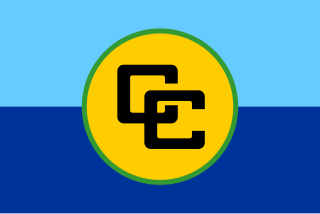Brian Cottle is a lawyer and judge from Saint Vincent and the Grenadines who has worked in a number of Commonwealth countries in the Caribbean.

Saint Vincent and the Grenadines is a country in the Lesser Antilles island arc, in the southern portion of the Windward Islands, which lies in the West Indies at the southern end of the eastern border of the Caribbean Sea where the latter meets the Atlantic Ocean. The sovereign state is also frequently known simply as Saint Vincent.

The Commonwealth of Nations, normally known as the Commonwealth, is a unique political association of 53 member states, nearly all of them former territories of the British Empire. The chief institutions of the organisation are the Commonwealth Secretariat, which focuses on intergovernmental aspects, and the Commonwealth Foundation, which focuses on non-governmental relations between member states.

The Caribbean is a region of The Americas that consists of the Caribbean Sea, its islands and the surrounding coasts. The region is southeast of the Gulf of Mexico and the North American mainland, east of Central America, and north of South America.
Cottle earned his bachelor of laws degree from the University of the West Indies. From 1987 to 1990, he worked as a lawyer in Trinidad and Tobago. Between 1990 and 2002, he worked in the Attorney-General's office in three successive countries: Saint Vincent and the Grenadines (1990–1999), Montserrat (2000–2002), and Antigua and Barbuda (2002).

The University of the West Indies (UWI), originally University College of the West Indies, is a public university system established to serve the higher education needs of the residents of 18 English-speaking countries and territories in the Caribbean: Anguilla, Antigua and Barbuda, The Bahamas, Barbados, Belize, Bermuda, British Virgin Islands, Cayman Islands, Dominica, Grenada, Guyana, Jamaica, Montserrat, St. Kitts and Nevis, St. Lucia, St. Vincent and the Grenadines, Trinidad and Tobago, and Turks and Caicos Islands. Each country is either a member of the Commonwealth of Nations or a British Overseas Territory. The aim of the university is to help 'unlock the potential for economic and cultural growth' in the West Indies, thus allowing improved regional autonomy. The University was originally instituted as an independent external college of the University of London.

Trinidad and Tobago, officially the Republic of Trinidad and Tobago, is a twin island country that is the southernmost nation of the West Indies in the Caribbean. It is situated 130 kilometres south of Grenada off the northern edge of the South American mainland, 11 kilometres off the coast of northeastern Venezuela. It shares maritime boundaries with Barbados to the northeast, Grenada to the northwest, Guyana to the southeast, and Venezuela to the south and west.

Montserrat is a British Overseas Territory (BOT) in the Caribbean. The island in the Leeward Islands, which is part of the chain known as the Lesser Antilles, in the West Indies. Montserrat measures approximately 16 km (10 mi) in length and 11 km (7 mi) in width, with approximately 40 km (25 mi) of coastline. Montserrat is nicknamed "The Emerald Isle of the Caribbean" both for its resemblance to coastal Ireland and for the Irish ancestry of many of its inhabitants.
In 2002, he was appointed by the Judicial and Legal Services Commission of the Caribbean Community to be a master in the Eastern Caribbean Supreme Court; he was elevated to High Court Judge in 2007. As a member of the Court, since 2002 he has been assigned to reside in and hear cases from Grenada, Saint Lucia, and Dominica. His most recent transfer—to the Dominica High Court—was in 2009.

The Caribbean Community is an organisation of fifteen Caribbean nations and dependencies whose main objective is to promote economic integration and cooperation among its members, to ensure that the benefits of integration are equitably shared, and to coordinate foreign policy. The organisation was established in 1973. Its major activities involve coordinating economic policies and development planning; devising and instituting special projects for the less-developed countries within its jurisdiction; operating as a regional single market for many of its members ; and handling regional trade disputes. The secretariat headquarters is in Georgetown, Guyana. CARICOM is an official United Nations Observer.
The Eastern Caribbean Supreme Court (ECSC) is a superior court of record for the Organisation of Eastern Caribbean States (OECS), including six independent states: Antigua and Barbuda, the Commonwealth of Dominica, Grenada, Saint Kitts and Nevis, Saint Lucia, Saint Vincent and the Grenadines and three British Overseas Territories. It has unlimited jurisdiction in each member State.

Grenada is a country in the West Indies in the Caribbean Sea at the southern end of the Grenadines island chain. Grenada consists of the island of Grenada itself plus six smaller islands which lie to the north of the main island. It is located northwest of Trinidad and Tobago, northeast of Venezuela and southwest of Saint Vincent and the Grenadines. Its size is 348.5 square kilometres (134.6 sq mi), and it had an estimated population of 107,317 in 2016. Its capital is St. George's. Grenada is also known as the "Island of Spice" due to its production of nutmeg and mace crops, of which it is one of the world's largest exporters. The national bird of Grenada is the critically endangered Grenada dove.


